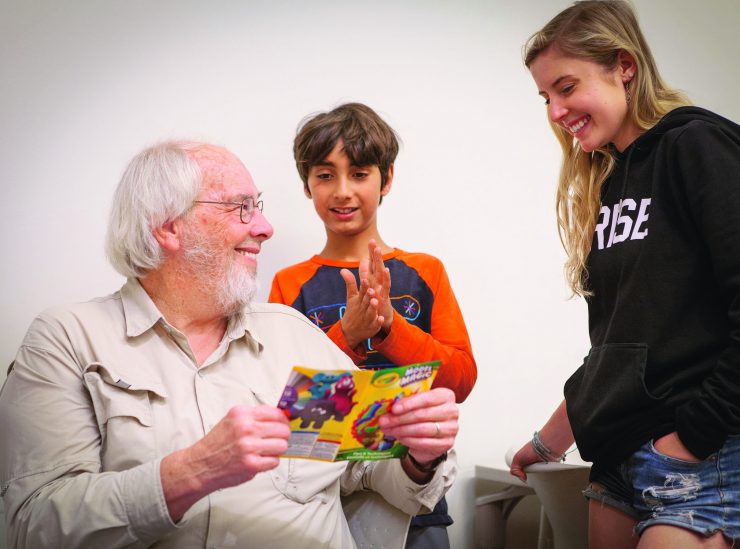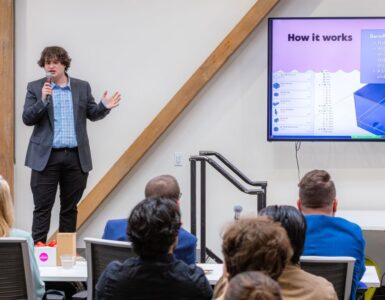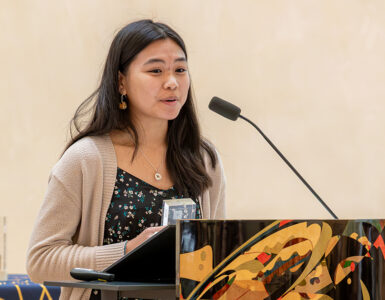They are on the brink of college degrees, jobs and graduate school. But the Chapman University students who gather on Fridays to create art with middle-school students see their younger selves in those they mentor.
Many of these college students know what it’s like to get C’s, D’s or even F’s on their report cards despite being bright, even gifted. Like the middle-schoolers, they have struggled to make friends, heard a teacher call them lazy or listened to their parents beg them to please, please just try harder.
“Everyone who’s in this organization has an LD (learning difference) or ADHD. That’s why it’s so amazing,” said Hayley Ratzan-Wank ’21.
This is the Chapman chapter of Eye to Eye, an innovative national mentoring program that pairs college or high school students with middle-school students with similar diagnoses. To these college students who have learned to manage their academic work, LD no longer means learning disability but simply learning difference, cognitive difference or their favorite term, diverse ability. They hope their influence can help younger students find their way.
At this point, they’re kind of struggling with the success part,” said Audrey Lane ’19, who teamed with Ratzan-Wank to lead 10 to 15 Chapman students in mentoring seven youngsters during Chapman’s first year bringing the groups together. “They’re not 100% sure of themselves, because they’re middle-schoolers. So we’ve all been there.”
The art activities are really just a hook for conversations. Chapman students talk with mentees about things like extended study time or test-taking time as a classroom accommodation, or coping methods like using computer features that read text aloud. All of it is guided by an Eye to Eye curriculum that student leaders from around the country learn during a weeklong Eye to Eye training session each summer.
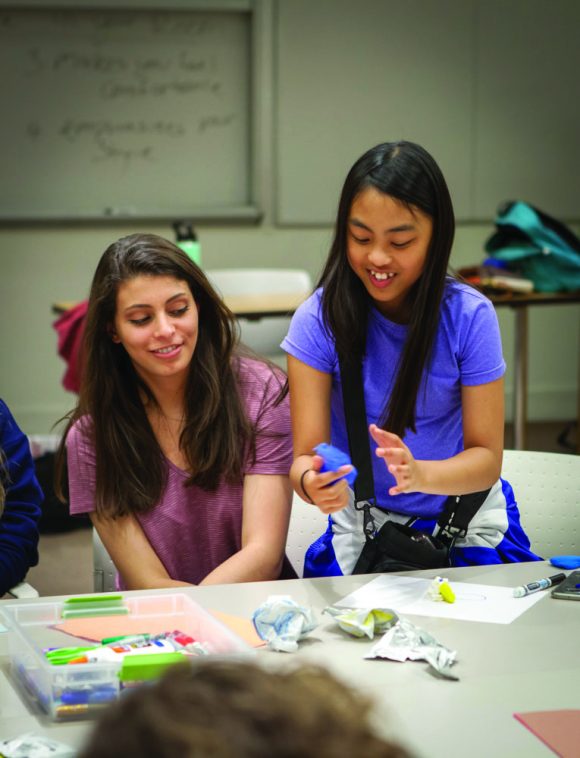
Those concepts spring to life for an hour in Beckman Hall each Friday afternoon during the school year. A college student might also mention offhand that they fidget a lot. “One of the kids said, ‘I do that too!’” Ratzan-Wank recalled. Another time, a college student diagnosed with dyslexia told a story about struggling to order from a menu. “One kid was just immediately like,‘That happens to me. I have to have my mom read it to me,’” Lane remembered.“It lights up their eyes.”
Sitting quietly to the side most Fridays is Jack Horner, the renowned paleontologist who was the technical advisor for the “Jurassic Park” movies and is now a Chapman lecturer and Presidential Fellow. Also on hand is Lisa Cupolo, a lecturer in English and director of Chapman’s Cognitive Diversity Project. Their excitement about the project is palpable.
“I wish I’d had something like this,” said Horner, who was diagnosed with dyslexia at 30 after he had repeatedly flunked out of college. He went on to win a MacArthur Fellowship, and his discoveries support the theory that dinosaurs cared for their young.
“I got one A and one B in my entire school career,” Horner said. “The A was in swimming in college, and the B was in geometry in high school, because it’s spatial. Everything else was C’s, D’s and lots of F’s.” Yet all the while, he kept winning the science fair. “It was project-based, and I could take the whole year to do it,” he said. “I won those science fairs but at the same time was flunking science.”
Cupolo is married to the accomplished writer and Chapman professor, Richard Bausch, who also has dyslexia. Seated at the table working on the day’s art project is their daughter Lila, a middle-schooler who seems more mature than her age but struggles at school with the same issue.
Cupolo and Horner had been working for a few years to try to create on campus a community of students with learning differences. They offered free pizza, trying to attract students. Nothing caught on until they presented the opportunity to help younger students.
“This is a new model,” Cupolo said. “The key was the mentorship.”
Their goals are bigger than this program, and they guide the Chapman students to make their own formal proposals to the administration with a light hand.
“We want to try to attract more students who have an LD or ADHD to Chapman and to really strike out the stigma of having an LD on campus,” Horner said.
The proof that these students can succeed in college is in plain view.
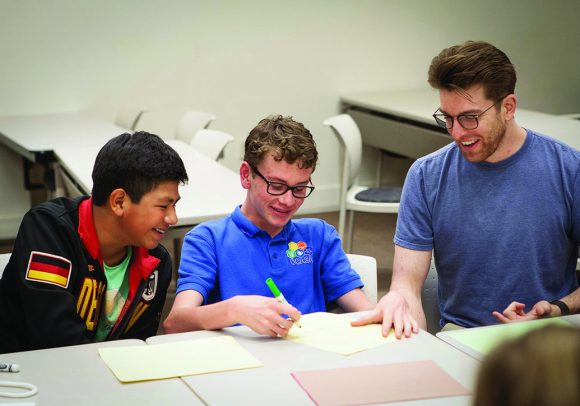
Ratzan-Wank, a psychology major with two minors, and Lane, who earned dual degrees in political science and psychology, have dyslexia. James Francese ’19, another of the mentors, earned a dual degree in mathematics and philosophy despite his ADHD. All three have made the Provost List with GPAs of 3.6 or higher. And this fall, Francese is beginning a Ph.D. program in mathematics at Texas Tech.
“A lot of people in this group actually are what is known as twice exceptional,” said Francese, whose grades suffered badly before he was diagnosed with attention issues at 16. “I was in gifted programs but also later in special education programs. It’s a confusing experience if you don’t really have a clear identity assigned to you.
“The reason why programs like this will succeed at Chapman coincides with the reasons why I came here,” he said.
Francese praised the University as a place “where the faculty members have a very direct connection to undergrads.”
Now some of those undergrads have a very direct connection to young students much like themselves.

